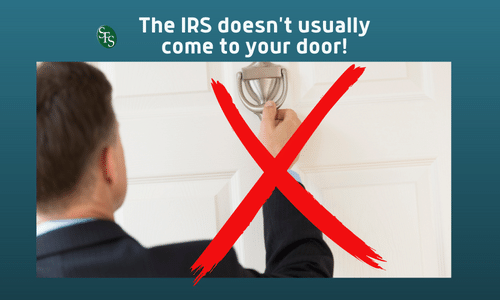How to know it’s really the IRS calling or knocking on your door
Many taxpayers have encountered individuals impersonating IRS officials – in person, over the telephone, and via email. Don’t get scammed. We want you to understand how and when the IRS contacts taxpayers and help you determine whether a contact you may have received is truly from an IRS employee.
The IRS initiates most contacts through regular mail delivered by the United States Postal Service.
However, there are special circumstances in which the IRS will call or come to a home or business, such as when a taxpayer has an overdue tax bill, to secure a delinquent tax return or a delinquent employment tax payment, or to tour a business as part of an audit or during criminal investigations.
Even then, taxpayers will generally first receive several letters (called “notices”) from the IRS in the mail.
Note that the IRS does not:
- Call to demand immediate payment using a specific payment method such as a prepaid debit card, gift card, or wire transfer. Generally, the IRS will first mail a bill to any taxpayer who owes taxes.
- Demand that you pay taxes without the opportunity to question or appeal the amount they say you owe.
- Threaten to bring in local police, immigration officers, or other law enforcement to have you arrested for not paying. The IRS also cannot revoke your driver’s license, business licenses, or immigration status. Threats like these are common tactics scam artists use to trick victims into buying into their schemes.
Here is what the IRS will do:
If an IRS representative visits you, they will always provide two official credentials: a pocket commission and an HSPD-12 card. HSPD-12 is a government-wide standard for secure and reliable forms of identification for Federal employees and contractors. You have the right to see these credentials.
Collections
IRS collection employees may call or come to a home or business unannounced to collect a tax debt. However, they will not demand that you make immediate payment to a source other than the U.S. Treasury.
The IRS can assign certain cases to private debt collectors but only after giving the taxpayer and their representative if one is appointed written notice. Private collection agencies will not ask for payment on a prepaid debit card or gift card. Payment by check should be payable to the U.S. Treasury and sent directly to the IRS, not the private collection agency.
Audits
IRS employees conducting audits may call taxpayers to set up appointments to discuss items with the taxpayers, but not without having first attempted to notify them by mail. Then, after mailing an official notification of an audit, an auditor/tax examiner may call to discuss items about the audit.
Criminal Investigations
IRS criminal investigators may visit a taxpayer’s home or business unannounced while conducting an investigation. However, these are federal law enforcement agents, and they will not demand any payment.
Beware of Impersonations
Scams take many shapes and forms, such as phone calls, letters, and emails. For example, many IRS impersonators use threats to intimidate and bully people into paying a fabricated tax bill. They may even threaten to arrest or deport their would-be victim if the victim doesn’t comply.
If you have any questions, contact us at, https://sfstaxacct.com/contact/


